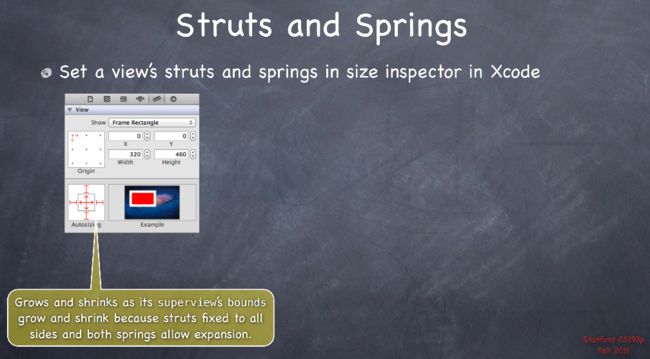这节课的内容主要是自动旋转,Objective C中的Protocols, 手势识别,Happiness Demo。
Autorotation
当你的设备旋转的时候,你可以用户界面是否和蛇别一起旋转,通过实现以下方法:
- (BOOL)shouldAutorotateToInterfaceOrientation:(UIInterfaceOrientation)orientation
{
return UIInterfaceOrientationIsPortrait(orientation); // only support portrait
return YES; // support all orientations
return (orientation != UIInterfaceOrientationPortraitUpsideDown); // anything but
}
Struts and Springs
可以通过设置view的struts and springs来控制旋转,红色的I是struts,红色的箭头是springs。
随着superview的bounds 缩放而缩放: 只在水平方向进行缩放: 固定大小,贴在左上角:通常随着UIView的bounds改变,不需要重新画,但是你也可以控制:
- struts和spring之后将drawing移动到指定位置
@property (nonatomic) UIViewContentMode contentMode;
UIViewContentMode{Left,Right,Top,Right,BottomLeft,BottomRight,TopLeft,TopRight}
- 缩放属性控制
UIViewContentModeScale{ToFill,AspectFill,AspectFit} // bit stretching/shrinking
分别是填充,内容填充,内容适应。 toFill是默认的模式,它会自动缩放像素点填满新的空间,可能会造成图形扭曲。
- 指定区域拉伸
@property (nonatomic) CGRect contentStretch;
初始化UIView
协议
@protocol Foo // implementors must implement Other and NSObject too
- (void)doSomething; // implementors must implement this (methods are @required by default)
@optional
- (int)getSomething; // implementors do not have to implement this
- (void)doSomethingOptionalWithArgument:(NSString *)argument; // also optional
@required
- (NSArray *)getManySomethings:(int)howMany; // back to being “must implement”
@property (nonatomic, strong) NSString *fooProp; // note that you must specify strength
@end
协议通常在自己的头文件或者要求其他类实现委托的类定义,如何使用:
类可以在@interface中声明它们实现了一个委托, 必须实现那些强制实现的类
#import “Foo.h” // importing the header file that declares the Foo @protocol
@interface MyClass : NSObject // MyClass is saying it implements the Foo @protocol
...
@end
可以定义有协议要求的id变量:
id obj = [[MyClass alloc] init];
也可以在方法的参数中要求实现协议:
@property (nonatomic, weak) id myFooProperty; // properties too!
协议的主要作用: 实现委托和数据源,
手势识别UIGestureRecognizer
UIGestureRecognizer是抽象类,需要自己实现具体的子类。手势识别分为两部, 创建手势,将其附加到UIView上,然后当手势别识别时进行实时处理。第一步由Controller完成,第二部由UIView自己完成。代码实例:
(void)setPannableView:(UIView *)pannableView
{
_pannableView = pannableView;
UIPanGestureRecognizer *pangr =
[[UIPanGestureRecognizer alloc] initWithTarget:pannableView action:@selector(pan:)];
[pannableView addGestureRecognizer:pangr];
}
识别手势之后,可以有View或者Controller处理手势,View一般处理View的修改,而Controller处理手势如何修改模型。
只有UIView实例可以识别手势(因为UIViews处理所有的触屏输入),任何对象都可以让UIView识别手势(通过在UIView中加入recognizer), 任何对象可以处理手势的识别(通过成为手势动作的作用目标)。
- UITapGestureRecognizer: 轻触手势,常用于给没有点击事件的控件添加该手势达到类似于button点击事件的效果。
#import "TapViewController.h"
@interface TapViewController ()
@end
@implementation TapViewController
- (void)viewDidLoad {
[super viewDidLoad];
[self test];
}
- (void)test {
UIImageView * imageView = [[UIImageView alloc] initWithFrame:CGRectMake(0, 0, 150, 100)];
imageView.center = self.view.center;
imageView.userInteractionEnabled = YES;
imageView.image = [UIImage imageNamed:@"c001"];
[self.view addSubview:imageView];
UITapGestureRecognizer * tap = [[UITapGestureRecognizer alloc] initWithTarget:self action:@selector(tapImage:)];
[imageView addGestureRecognizer:tap];
}
- (void)tapImage:(UITapGestureRecognizer *)tap {
UIImageView * imageView = (UIImageView *)tap.view;
static int flag = 0;
flag ^= 1;
if (flag) {
imageView.frame = CGRectMake(0, 0, 300, 200);
NSLog(@"点击了图片放大!");
} else {
imageView.frame = CGRectMake(0, 0, 150, 100);
NSLog(@"点击了图片缩小!");
}
imageView.center = self.view.center;
}
@end
- UIPanGestureRecognizer: 拖拽手势,常用于需要对控件进行手动拖拽以改变控件的frame的场景中
#import "PanViewController.h"
@interface PanViewController ()
// 图片初始中心点
@property (nonatomic) CGPoint startImageCenter;
// 手势初始中心点
@property (nonatomic) CGPoint startGCenter;
@end
@implementation PanViewController
- (void)viewDidLoad {
[super viewDidLoad];
[self test];
}
- (void)test {
UIImageView * imageView = [[UIImageView alloc] initWithFrame:CGRectMake(20, 80, 200, 150)];
imageView.userInteractionEnabled = YES;
imageView.image = [UIImage imageNamed:@"c001"];
[self.view addSubview:imageView];
UIPanGestureRecognizer * pan = [[UIPanGestureRecognizer alloc] initWithTarget:self action:@selector(panImage:)];
[imageView addGestureRecognizer:pan];
}
- (void)panImage:(UIPanGestureRecognizer *)pan {
UIImageView * imageView = (UIImageView *)pan.view;
if (pan.state == UIGestureRecognizerStateBegan) {
//记录中心位置
self.startImageCenter = imageView.center;
self.startGCenter = [pan locationInView:self.view];
return;
}
//非开始阶段
//获得手势移动的距离 现在的位置
CGPoint nowGCenter = [pan locationInView:self.view];
float x = nowGCenter.x - self.startGCenter.x;
float y = nowGCenter.y - self.startGCenter.y;
//计算imageview的相对位移
imageView.center = CGPointMake(self.startImageCenter.x+x, self.startImageCenter.y+y);
- UISwipeGestureRecognizer:轻扫手势,常用于对控件往对应的方向有滑动操作时的场景中
#import "SwipeViewController.h"
@interface SwipeViewController ()
@end
@implementation SwipeViewController
- (void)viewDidLoad {
[super viewDidLoad];
[self test];
}
- (void)test {
UIImageView * imageView = [[UIImageView alloc] initWithFrame:CGRectMake(20, 80, 200, 150)];
imageView.center = self.view.center;
imageView.userInteractionEnabled = YES;
imageView.image = [UIImage imageNamed:@"c001"];
[self.view addSubview:imageView];
UISwipeGestureRecognizer * swipe1 = [[UISwipeGestureRecognizer alloc] initWithTarget:self action:@selector(swipeImage:)];
//设置扫的方向
swipe1.direction = UISwipeGestureRecognizerDirectionUp;
[imageView addGestureRecognizer:swipe1];
UISwipeGestureRecognizer * swipe2 = [[UISwipeGestureRecognizer alloc] initWithTarget:self action:@selector(swipeImage:)];
//设置扫的方向
swipe2.direction = UISwipeGestureRecognizerDirectionLeft;
[imageView addGestureRecognizer:swipe2];
UISwipeGestureRecognizer * swipe3 = [[UISwipeGestureRecognizer alloc] initWithTarget:self action:@selector(swipeImage:)];
//设置扫的方向
swipe3.direction = UISwipeGestureRecognizerDirectionDown;
[imageView addGestureRecognizer:swipe3];
UISwipeGestureRecognizer * swipe4 = [[UISwipeGestureRecognizer alloc] initWithTarget:self action:@selector(swipeImage:)];
//设置扫的方向
swipe4.direction = UISwipeGestureRecognizerDirectionRight;
[imageView addGestureRecognizer:swipe4];
}
-(void)swipeImage:(UISwipeGestureRecognizer *)swipe{
//实现要添加的功能
NSLog(@"扫到了图片");
UIImageView * imageView = (UIImageView *)swipe.view;
if (swipe.direction == UISwipeGestureRecognizerDirectionLeft) {
imageView.center = CGPointMake(imageView.center.x - 40, imageView.center.y);
NSLog(@"图片向左移动了");
}else if (swipe.direction == UISwipeGestureRecognizerDirectionRight) {
imageView.center = CGPointMake(imageView.center.x + 40, imageView.center.y);
NSLog(@"图片向右移动了");
}else if (swipe.direction == UISwipeGestureRecognizerDirectionDown) {
imageView.center = CGPointMake(imageView.center.x, imageView.center.y + 40);
NSLog(@"图片向下移动了");
}else if (swipe.direction == UISwipeGestureRecognizerDirectionUp) {
imageView.center = CGPointMake(imageView.center.x, imageView.center.y - 40);
NSLog(@"图片向上移动了");
}
}
@end
- UILongPressGestureRecognizer:长按手势,常用于对控件进行长按操作时的场景中
#import "LongPressViewController.h"
@interface LongPressViewController ()
@end
@implementation LongPressViewController
- (void)viewDidLoad {
[super viewDidLoad];
[self test];
}
- (void)test {
UIImageView * imageView = [[UIImageView alloc] initWithFrame:CGRectMake(0, 0, 150, 100)];
imageView.center = self.view.center;
imageView.userInteractionEnabled = YES;
imageView.image = [UIImage imageNamed:@"c001"];
[self.view addSubview:imageView];
UILongPressGestureRecognizer * longPress = [[UILongPressGestureRecognizer alloc] initWithTarget:self action:@selector(longPressImage:)];
// 长按时间
longPress.minimumPressDuration = 2;
[imageView addGestureRecognizer:longPress];
}
-(void)longPressImage:(UILongPressGestureRecognizer *)longPress{
UIImageView * imageView = (UIImageView *)longPress.view;
if (longPress.state == UIGestureRecognizerStateBegan) {
NSLog(@"长按了这张图片");
[UIView animateWithDuration:1.0 animations:^{
imageView.frame = CGRectMake(0, 0, 300, 200);
imageView.center = self.view.center;
}];
}
if (longPress.state == UIGestureRecognizerStateEnded) {
NSLog(@"长按结束");
[UIView animateWithDuration:1.0 animations:^{
imageView.frame = CGRectMake(0, 0, 150, 100);
imageView.center = self.view.center;
}];
}
}
@end
- UIRotationGestureRecognizer:旋转手势,常用于对控件的旋转操作的场景中
#import "RotationViewController.h"
@interface RotationViewController ()
// 图片初始角度
@property (nonatomic, assign) float startRotation;
@end
@implementation RotationViewController
- (void)viewDidLoad {
[super viewDidLoad];
[self test];
}
- (void)test {
UIImageView * imageView = [[UIImageView alloc] initWithFrame:CGRectMake(0, 0, 300, 200)];
imageView.center = self.view.center;
imageView.userInteractionEnabled = YES;
imageView.image = [UIImage imageNamed:@"c001"];
[self.view addSubview:imageView];
UIRotationGestureRecognizer * rotation = [[UIRotationGestureRecognizer alloc] initWithTarget:self action:@selector(rotationImage:)];
[imageView addGestureRecognizer:rotation];
}
-(void)rotationImage:(UIRotationGestureRecognizer *)rotation{
UIImageView * imageView = (UIImageView *)rotation.view;
// 旋转图片
imageView.transform = CGAffineTransformMakeRotation(rotation.rotation + self.startRotation);
if (rotation.state == UIGestureRecognizerStateEnded) {
self.startRotation += rotation.rotation;
}
}
@end
- UIPinchGestureRecognizer:捏合缩放手势,常用于对图片的捏合缩放的操作场景中
#import "PinchViewController.h"
@interface PinchViewController ()
// 图片初始缩放系数
@property (nonatomic, assign) float startScale;
@end
@implementation PinchViewController
- (void)viewDidLoad {
[super viewDidLoad];
[self test];
}
- (void)test {
self.startScale = 1.0;
UIImageView * imageView = [[UIImageView alloc] initWithFrame:CGRectMake(0, 0, 300, 200)];
imageView.center = self.view.center;
imageView.userInteractionEnabled = YES;
imageView.image = [UIImage imageNamed:@"c001"];
[self.view addSubview:imageView];
UIPinchGestureRecognizer * pinch = [[UIPinchGestureRecognizer alloc] initWithTarget:self action:@selector(pinchImage:)];
[imageView addGestureRecognizer:pinch];
}
-(void)pinchImage:(UIPinchGestureRecognizer *)pinch{
UIImageView * imageView = (UIImageView *)pinch.view;
// 缩放图片
imageView.transform = CGAffineTransformMakeScale(pinch.scale * self.startScale, pinch.scale * self.startScale);
if (pinch.state == UIGestureRecognizerStateEnded) {
self.startScale *= pinch.scale;
if (self.startScale >= 2.0) {
self.startScale = 2.0;
[UIView animateWithDuration:0.3 animations:^{
imageView.transform = CGAffineTransformMakeScale(self.startScale, self.startScale);
}];
} else if (self.startScale <= 0.5) {
self.startScale = 0.5;
[UIView animateWithDuration:0.3 animations:^{
imageView.transform = CGAffineTransformMakeScale(self.startScale, self.startScale);
}];
}
}
}
@end
Reference
- https://www.jianshu.com/p/b887af45d5de


